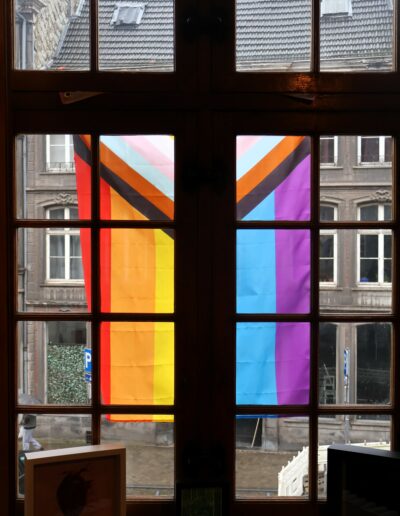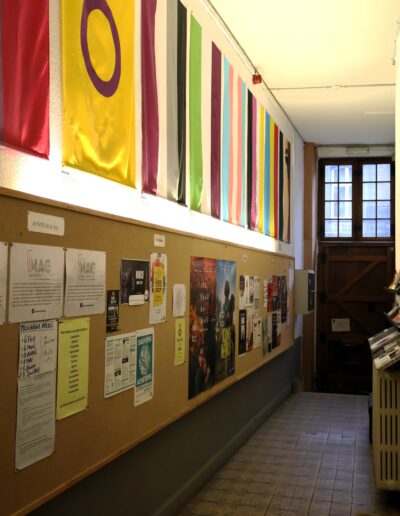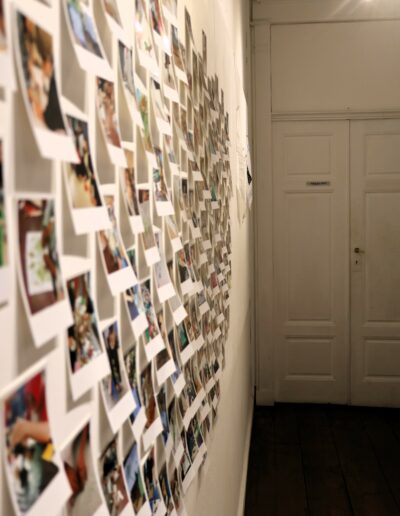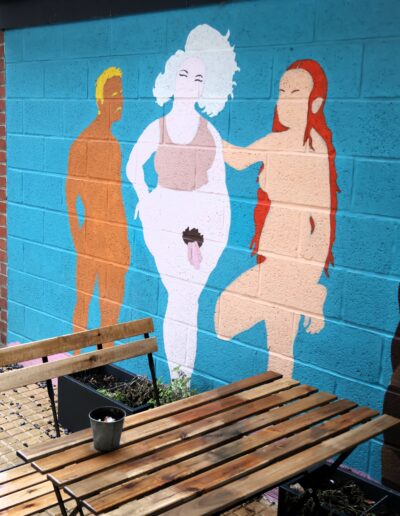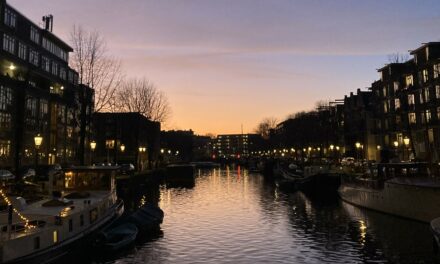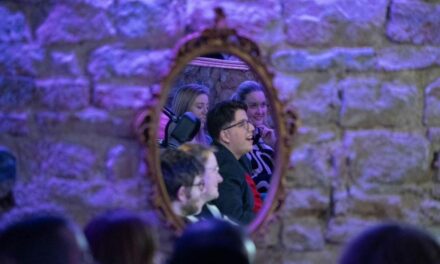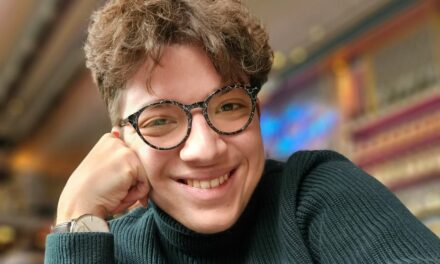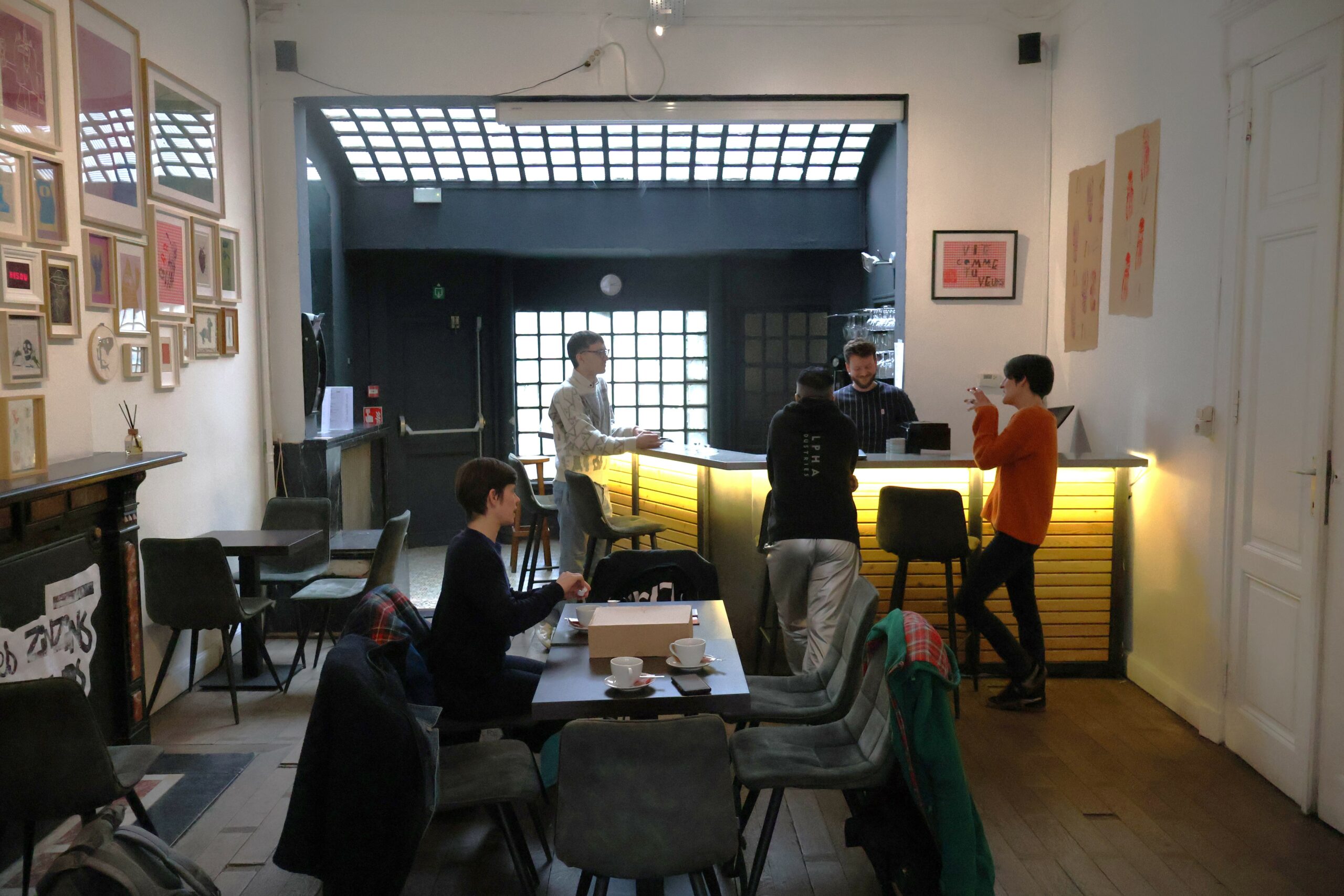
Knock, knock… Some 50 meters away from a rainbow-coloured pedestrian crosswalk, the team of the Rainbow Center Luxembourg reaches the stately wooden door of a historic building in Liège. Its dark-grey facade and tall windows may seem imposing, but the rainbow and trans-flags draped from the second-floor quickly remind us where we are: The Maison Arc-en-Ciel (translated, Rainbow House) of Liège.
Knock, knock… Some 50 meters away from a rainbow-coloured pedestrian crosswalk, the team of the Rainbow Center Luxembourg reaches the stately wooden door of a historic building in Liège. Its dark-grey facade and tall windows may seem imposing, but the rainbow and trans-flags draped from the second-floor quickly remind us where we are: The Maison Arc-en-Ciel (translated, Rainbow House) of Liège.
As we raise our hands to knock a second time, the door swings open and a handsome man steps out, “Hi, I am Marvin Desaive, coordinator of the Rainbow House,” he said, as he went on for the indispensable Belgian greeting etiquette: a kiss on the cheek.
We’ve traveled to Liège to connect with our peers, exchange ideas, and learn how organizations with missions similar to ours function—their successes, their failures, and their challenges, and how we can support one another.
Marvin led us inside, and we stepped into their exhibition space—two connected high-ceiling rooms with wooden floors showcasing drawings from local queer artists. “Every month, a new artist is invited to exhibit their work here,” explained Marvin, as he moved toward the bar on the right side of the room, offering us coffee. Like the Rainbow Center in Luxembourg, exhibitions are a key part of their programming. The presence of a bar, however, suggests their work mission extends beyond that of a cultural center. René, one of our colleagues, knows this first-hand. He attended their annual garden party last year.
The garden party, Marvin’s favorite, is held every year in September in the backyard of the Maison Arc-en-Ciel. “It’s truly a magical evening”, said Marvin, “it’s about enjoying diversity. On that evening, all members of the community come together”. The event involves DJs, drag performers, and even makeup booths for guests to add a touch of glitter to the night. Marvin winked, “We love to party here in Liège”. We nodded in chorus, as if to signal to Marvin that we all value a good party. Luxembourg has only one openly gay bar left.
Beyond their social and cultural offer, they also have a team of social workers that serves as a first point of contact for individuals seeking guidance on queer-related issues. Like Centre LGBTIQ+ CIGALE in Luxembourg, they offer one-to-one counselling, resources, and community connections for people of all ages.
For Marvin, working at an organization with a rich history of community support is deeply meaningful. The roots of the Maison Arc-en-Ciel go back to 1995, when students from the University of Liège founded the Cercle Homosexuel Étudiant Liégeois (CHEL), inspired by a similar student association at the Université libre de Bruxelles, established in 1981.
Originally exclusive to people under 30, CHEL’s alumni founded Alliàge in 1997 to serve older members. Over the years, Alliàge kept growing, eventually establishing a physical space in 2004–the Maison Arc-en-Ciel–it predated Luxembourg’s own queer culture center, the Rainbow Center, by nearly two decades. Today, the organization operates under the name Maison Arc-en-Ciel de Liège–Alliàge asbl while the original CHEL evolved into the youth-focused Cercle Arc-en-ciel Liégeois (CALi).
Since their foundation, there have been some difficulties because “we have to be welcoming to everyone, in Liège and abroad, and in order to do so, it is important to keep in mind we must remain neutral,” Marvin insisted. Funded by the city, the Maison Arc-en-Ciel coexists with more politically charged queer activist collectives in Liège. “While we aim to build bridges with these collectives, it can sometimes be tricky. We have faced backlash on social media. Bringing people together while maintaining neutrality isn’t always easy”.
This echoed a similar situation in Luxembourg, when artist collective Richtung22 voiced pinkwashing concerns regarding the organization of Pride in a theater play entitled Mis(s) Representation, during Pride season 2023 in the city of Esch. While such an incident underscored the divide between the national LGBTIQA+ organization and more uncompromising queer activists, it also highlighted the need to maintain constructive criticism, a healthy, pluralistic queer landscape where every voice counts.
This dynamic might sound familiar to queer people in Luxembourg. In 2023, artist collective Richtung22 voiced concern about pinkwashing in a theater play entitled Mis(s) Representation during Pride. Such tensions reflected a broader friction between two different but essential forces–grassroots activism and community resources. This coexistence keeps both forces accountable, fostering growth and pushing everyone to do better.
As we wrapped up our visit, Marvin reminded us that the Maison Arc-en-Ciel’s office song was “Pink Pony Club” by Chapell Roan. The lyrics felt like the perfect closing note: “And I heard that there’s a special place, Where boys and girls can all be queens every single day.” While we might not all want to be queens every single day, we all deserve that special place where we can be whoever we want to be. And the Maison Arc-en-Ciel is one of those places. If you ever visit, make sure to give them our warmest greetings – and don’t forget the bise!

